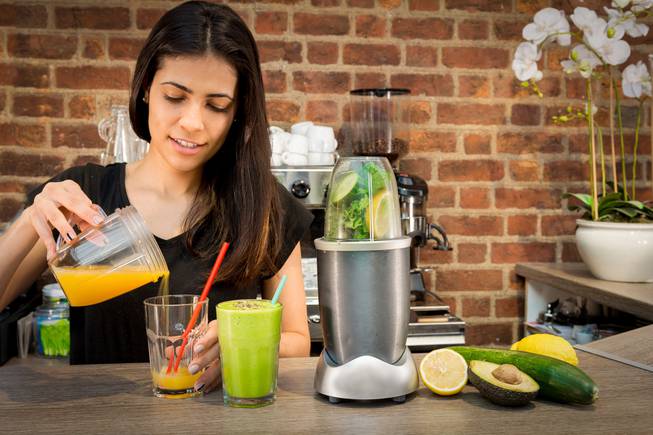
Shutterstock.com
Saturday, Aug. 1, 2020 | 2 a.m.
Boosting our immune system to help us fight disease and illness more effectively is crucial, pandemic or no. Eating healthy, along with exercising regularly and engaging in stress-relieving activities, are critical.
“Through a balanced, varied diet, you can improve your immune system by consuming antioxidant-rich foods and phytochemicals, or chemical compounds of plant origin,” explains Samantha M. Coogan, director of the Didactic Program in Nutrition and Dietetics at UNLV.
Coogan says that “antioxidants fight off free radicals,” which, according to MedicalNewsToday.com, “are unstable atoms that can damage cells,” which can lead to potential infection. “When these cellular linings are broken or disrupted, foreign matter or waste products can potentially enter the cell and attack the organelles and cell as a whole,” Coogan says, adding that such antioxidants as vitamins A, C and E, along with copper, selenium and zinc, are beneficial in helping to prevent these kinds of attacks on cells.
While people often turn to supplements to get antioxidants and vitamins, Coogan doesn’t recommend them. “Food first,” she says, followed by supplements “only if necessary.”
Move for Health
Exercise is another important factor in maintaining a healthy lifestyle. Working out “directly affects your immune system because of the purposeful stress response you put onto the body,” Coogan says, adding that when we work out, free radicals are produced.
But isn’t that counterproductive?
Foods rich in antioxidants
So you want to boost your immune system, but you’re not sure what to eat. Samantha M. Coogan, director of the Didactic Program in Nutrition and Dietetics at UNLV, has some recommendations. Next time you’re at the grocery store, load up on the following:
■ red, orange and yellow produce
■ citrus fruits
■ berries
■ green, leafy vegetables
■ squashes
■ gourds
■ eggplant
■ garlic
■ onion
■ leeks
■ seafood
■ meat
■ eggs
■ milk
■ nuts
■ green tea
Coogan says the production of free radicals is “a normal occurrence,” and explains why nutrition before and after a workout is critical “to help fight off those free radicals after your exercise session, and to help recover and repair the stressed and damaged muscle tissue.”
Again, Coogan assures this is all completely normal, and even beneficial. “The more we expose our bodies to that type of external stimulus, it requires the body to react every time,” she says. “Each time, it will adapt more quickly and readily.”
Finding a safe way to exercise during the pandemic can present its difficulties, especially in the summer when living in the desert. Lifting weights at home, following a yoga instruction video on YouTube and hiking are just a few ways to incorporate activity into your daily routine.
Another advantage of exercise: its role in alleviating stress, which can wreak havoc on the immune system.
“Neurotransmitters and stress hormones are released in direct response to external stimuli, whether it be physical stress—like exercise or physical trauma—or mental and emotional stress,” Coogan says. “Cortisol tends to be one of the biggest culprits when it comes to stress, which also hinders weight management or loss, because cortisol increases fat around the organs,” known as visceral fat. While other stress hormones like epinephrine and norepinephrine are responsible for the “fight or flight” response, cortisol is the main obstacle when it comes to weight maintenance and our stress response, Coogan says.
Exercise for the mind
People are more stressed now than ever before, but even during a pandemic, we can incorporate stress-relieving activities into our daily lives.
One way to reduce stressful responses: Give yourself something on which to focus. “Stimulating your brain can help stave off stress, especially if you try something new,” Coogan says, although she clarifies that doing something familiar can be just as effective.
“Find something unrelated to work, school, the pandemic or what’s going on around the world right now, and find something that brings you happiness and puts a smile on your face,” Coogan says. The health expert recommends video games, a comforting TV show or movie, reading, meditation, puzzles, yoga, brain teasers, painting, adult coloring books, an instrument, knitting or learning a new skill.
Coogan says that during the pandemic, she picked up embroidery as a new hobby. “I’m so in love with it,” she says. “I am a very detail-oriented person, and getting lost in the intricacies of the patterns and the way the threads come together to form this beautiful work of art produces very happy hormones and brings me a lot of joy and satisfaction in the work I’ve done. I can get lost in it for hours as I give all my attention to the detail of the pattern, with my favorite music playing or a comedy special on in the background.”
Coogan says the activity doesn’t have to be intricate or complicated—or “produce” anything. “If it has a positive benefit to you, keep doing it,” she says. “If you’ve mastered that boss level 100 times, but each time you do it, it makes you feel good, then keep doing it. If sitting on the couch for nine hours straight binge-watching See with Jason Momoa brings you joy and fulfillment for that day, despite no productivity in the traditional sense, that’s also OK,” Coogan says, adding that she may or may not have done that herself.
“Vegging out,” she says, is still a way of taking control of stress. “Just don’t let yourself get lost in your own silence or your own head,” Coogan says, warning that can trigger even more stress. It’s all about moderation and finding healthy habits.
“Make sure to switch up what you’re doing,” she says—and maybe don’t binge-watch Netflix every single day.
For more information on micronutrients, Coogan suggests visiting the National Institutes of Health’s nutrient recommendation page.
This story appeared in Las Vegas Weekly.
